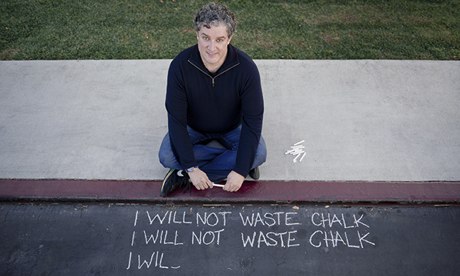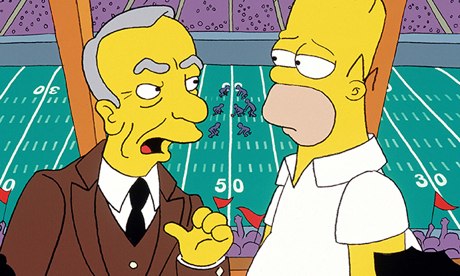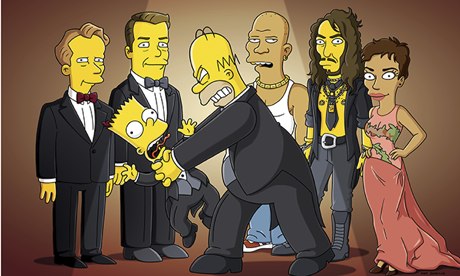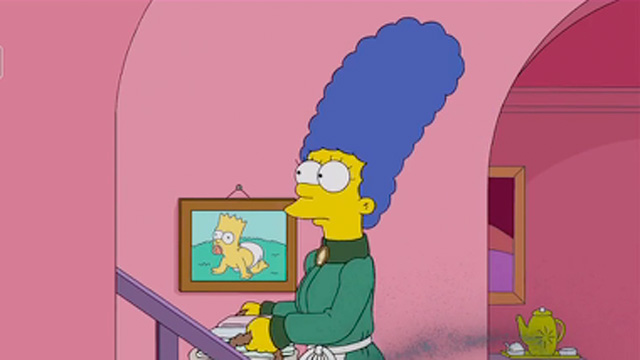
'I always believed the show had a moral centre' … Al Jean, writer and producer of The Simpsons
When The Simpsons debuted on television in 1987, it was as a series of fleeting animated sketches intended to bridge commercial breaks in The Tracey Ullman Show. There was little reason to think Bart, Homer, Marge and Lisa would endure. They were a peculiar yellow, crudely drawn and conceived as ephemeral. A likelier bet for pop cultural dominance would have been Rick Astley, then storming the charts with Never Gonna Give You Up, or maybe Timothy Dalton as James Bond.
The Ullman show's live audience giggled at the animated snippets, however, so the Fox network adapted the cartoon into a half-hour series in December 1989. Almost a quarter of a century later, The Simpsons is the US's longest-running sitcom, with a stamina that makes Cheers, Seinfeld and Friends seem will o' the wisp. As it zips through a 25th season, it shows no sign of stopping, or of losing its status as a global phenomenon.
"It turned into a 25-year occupation. It's amazing. Most shows are happy to last just five years," marvels Al Jean, one of the original writers, who now runs the show. He grins and shakes his head. "I'm glad I've been here all that time."
We are in a corner of the Fox lot in Los Angeles known as building 203, a clutch of small, nondescript offices that serve as Simpsons central. Jean, 52, oversees 20 writers whose job is to defy entertainment gravity by producing storylines and jokes that continue to zing after more than 500 episodes.
The Simpsons is literally part of the studio landscape. Hedges are cut into the shape of some characters and a big, colourful mural serves as a signpost. "After Star Wars [another mural], continue past Homer and take a right," says the guard at reception.
How has the show lasted so long? And how much longer will it run? Jean, the day-to-day manager, should know better than anyone. A large, shambling-looking man in runners, jeans and sweater, if you passed him in the street you might think him a plumber nipping out for donuts. In fact, like many of the writers, he is a mathematics geek – more of that later – with a genius for comedy who has polished and protected one of the jewels in Rupert Murdoch's TV empire.
Jean started as a writer, and has been the showrunner since 2001, liaising with creator Matt Groening, Fox executives, writers and voice actors such as Dan Castellaneta, Julie Kavner and Nancy Cartwright. His desk is invisible beneath piles of jottings, books, magazines and DVDs. Simpsons paraphernalia competes for shelf space with more books and films. There's a freshness to the mess, as if regularly rummaged.
Link to video: The Simpsons do Downton Abbey
In the early days, Jean recalls, parodying US mores via a dysfunctional, chaotic family provoked ire. Homer was an obese doofus, his son, Bart, a subversive brat. "It was extremely controversial in some quarters, and for a while it had this reputation of being kind of vulgar. My daughter's school said you couldn't wear a Simpsons T-shirt. I always thought that the show was much richer than that and had a moral centre. And I believe after the passage of time and many viewings people said, yeah, that's true."
Jean agrees with producer Jim Brooks that The Simpsons started as counter-culture and became culture. The show has won 27 Emmys, been named the 20th century's best TV series by Time magazine and spawned billions of dollars worth of advertising, video games, theme park rides, box office tickets and merchandise. Plus it introduced "D'oh!", "Eat my shorts" and "Don't have a cow, man" to multiple languages.
"Now at that same school where my younger daughter goes they want Simpsons items for auction," says Jean. "Times have changed."
Overtaking NBC's The Cosby Show in the ratings in the early 1990s marked a coming of age. "A big deal. That was, 'Gee, we aren't going anywhere. We're staying.'"
President George Bush memorably tripped over the zeitgeist in 1992 by saying he wanted to make American families more like The Waltons – a depression-set drama – and less like The Simpsons.
Jean doubts the president had watched the show. "I think his speech writer somewhat maladroitly thought it would be a funny thing to say. Our response was that Americans are like the Simpsons. To say Americans (should) be like the Waltons … well, they were a very sad family with no money."
The show responded by having Bart slyly compare his family to the Waltons. "We're praying for an end to the depression, too." Jean does not claim any causality but Bush, appearing out of touch with recession-hit voters, lost his re-election bid later that year.
Some writers pitched gags about the second President Bush, but the show largely steered clear because of his volatile ratings and image. "After 9/11 people were saying: 'You can't make fun of him, you can't make a joke about the president, it's too serious a time.' Then it went to the opposite where he was widely ridiculed. We work a year ahead and we try to do things which we know will be true when we air," says Jean. Lacking an actor who did good Dubya was another factor.

Rupert Murdoch the "billionaire tyrant" and Homer in The Simpsons. Photograph: Capital Pictures
Some writers use Comic Book Guy, a potbellied, sarcastic nerd to vent their own opinions, but the show tends not to pick on specific people, says Jean. "We have kind of a liberal bent, but we try to be even-handed … and it's easier for us to do that with causes than it is with individuals."
The show has tackled homosexuality several times, notably in a 2005 episode in which Springfield legalises same-sex weddings and Marge's sister, Patty, comes out as gay. Marge eventually accepts her. Homer, initially hostile, becomes a minister and erects a sign – "Will marry anyone to anything" – after discovering he can charge couples $200. Conservative groups complained, but it was the season's highest-rated show.
Government snooping is a recurring theme. In the 2010 episode To Surveil with Love, authorities suspend civil liberties after a radiation leak from Homer's gym bag. An English security consultant played by Eddie Izzard installs security cameras to spy on townspeople, prompting rebellion. They then learn they were being taped for a British reality TV show called American Oafs.
"I could see us doing something about phone-hacking," says Jean, unabashed that Murdoch newspapers are at the heart of the scandal. The mogul has voiced himself as a "billionaire tyrant" in two episodes. The writers have also poked fun at their own network. "We can push it pretty far," says Jean.
Revelations about NSA surveillance may generate fresh storylines, but Edward Snowden is unlikely to star after Julian Assange's trumpeted cameo for the 500th episode last year drew a disappointing audience. At least in cartoons, leakers have limited impact.
Favourite guests include Kelsey Grammer, Anne Hathaway and Daniel Radcliffe, who will return this season to play a peculiar friend of Bart's. The Harry Potter star – at 24, the same age as The Simpsons – is such a fan he watches the DVD commentaries. "I'll make sure to be very complimentary towards him in the commentary," laughs Jean.
Less successful guests were the baseball player Jose Canseco, who insisted on rewrites and refused to do retakes, and Jon Bon Jovi. "He said, 'Please write me a script.' So we did, then he turned it down. He was covered with spaghetti in the part – maybe he didn't like that."
Some topics remain off-limits – "there's nothing funny about school shootings". Death, however, will visit this season: an important character will die. Which one, and how, has fandom ablaze with speculation. "All I can say is a character passes away," Jean says coyly. Pressed, he says: "What's funny is the last word." Rosebud? "No, not Rosebud."

Homer and Bart Simpson with celebrity guests including Ricky Gervais, Russell Brand and Halle Berry in 2011. Photograph: Fox
A sequel to the 2007 feature film is not ruled out, but there is nothing planned. The writers, divided into two 10-strong teams in different rooms, have an eye for YouTube clips, but the main challenge remains crafting 30-minute stories without repeating previous episodes.
Critics periodically declare The Simpsons passe, as website Flavorwire did in 2012: "A show that once had so many smart and original things to say about American culture has long seemed behind the times, its criticism mild and stale." Ian Jones in the Guardian wrote in 2007 that "The Simpsons of today revels in big, stupid antics, one-note gags and obvious plot twists," while Fan Forum in 2003 wrote, "the absurdity it once had is now almost self-parody". A coming episode that mixes in characters from Futurama, the Groening-created science-fiction sitcom set 1,000 years hence, may fuel accusations of creative funk, but Jean bats that away with a sigh. Grumbling dates back to 1990, when some said the second season lacked the first's bite.
A rotating pool of new and veteran writers mines ideas from multiple sources. "You get them from real life. Teachers you had, problems your kids are going through, things that happened to you as a kid, things you read in the paper. It's always about families and about things that happen to them." A noticeboard over his desk is filled with his own family's photographs, doodles and drawings.
The British author Simon Singh recently revealed an additional, unexpected source of creativity in The Simpsons and their Mathematical Secrets, a book detailing how Jean and writing colleagues such as David X Cohen, Jeff Westbrook and Stewart Burns have advanced degrees in maths and physics – and how they weave calculus, geometry and equations into plots.
"People think maths is about processing numbers and an answer comes out, but in fact it's an incredibly creative field," says Singh. The mystery and beauty of pi, googolplex and infinity have appeared in some form, even if only attentive geeks got the jokes.
Mathematics, says Singh, suggests the show is unlikely to end immediately or continue for a million years. "It's fairly haphazard logic, but when you pick something at random, chances are you're in the middle of it." Prepare yourself, in other words, for possibly another quarter-century of The Simpsons.
• This article was amended on 23 December 2013 because the second season of The Simpsons was first broadcast in 1990, not 1999 as the original said.
Source: http://www.theguardian.com/tv-and-radio/2013/dec/20/the-simpsons-25th-season-al-jean




